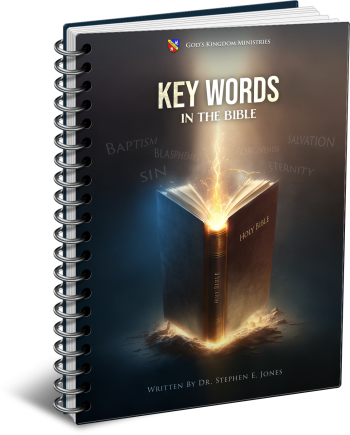Latest Posts
View the latest posts in an easy-to-read list format, with filtering options.

To understand what Scripture says, one must know the meaning of words and key concepts. This book is designed to prevent misunderstanding.
Category - General

Leviticus 25:24 says,
24 Thus for every piece of your property, you are to provide for the redemption [ge’ullah] of the land.
The Hebrew word ge’ulla is the feminine form of the word ga’al, “to redeem.” It means “redemption, right of redemption, price of redemption.”
The right of redemption is given to a kinsman, and so the word implies kinship. Anyone may redeem a debtor, but only a kinsman has the right of redemption. All others may negotiate to redeem someone or something, but in such cases the creditor or slave owner is not compelled to sell the one who the potential redeemer wants to redeem.
So we read in Lev. 25:25-27,
25 If a fellow countryman of yours becomes so poor he has to sell part of his property, then his nearest kinsman is to come and buy back what his relative has sold. 26 Or in case a man has no kinsman, but so recovers his means as to find sufficient for its redemption, 27 then he shall calculate the years since its sale and refund the balance to the man to whom he sold it, and so return to his property.
In the days of Joshua, the land was divided among the 12 tribes, and the families within each of the tribes received their portion of the inheritance. This was then subdivided among their children. But if one of them became poor and decided to sell his land, the sale was not permanent. Actually, he did not have the right to sell his land for all time. He was really selling the rights to the land until the year of Jubilee, when the land was to be returned to the original inheritor.
The value of the property being sold was measured by its ability to produce barley multiplied by the number of harvest years to the next year of Jubilee. We see this in the case of a man consecrating his field to God. Lev. 27:16, 18 says,
16 Again, if a man consecrates to the Lord part of the fields of his own property, then your valuation shall be proportionate to the seed needed for it; a homer of barley seed at fifty shekels of silver… 18 If he consecrates his field after the Jubilee, however, then the priest shall calculate the price for him proportionate to the years that are left until the year of Jubilee…
As for a normal sale of property, we read in Lev. 27:24,
24 In the year of Jubilee, the field shall return to the one from whom he bought it, to whom the possession of the land belongs.
This Kingdom principle takes the speculation out of the property market and establishes a silver-barley monetary standard. See my booklet, Biblical Money.
The law specifies rights. God has certain rights, and the people have certain rights. The land laws give the people the right to own property, but this right is not without limits, because ultimately, God is the primary Landowner. Lev. 25:23 says,
23 The land, moreover, shall not be sold permanently, for the land is Mine; for you are but aliens and sojourners with Me.
God then gives the terms and conditions by which the Israelites were allowed to “own” God’s land. They were to follow the laws of redemption, which were linked to their Sabbaths and Jubilees. If they violated those laws, God retained the right to expel them from His land and to give it to whomsoever He pleased.
We know, of course, that this is precisely what happened in Israel’s captivity to Assyria and to Judah’s captivity to Babylon. Such a possibility was spelled out in Leviticus 26 and again in Deuteronomy 28. In Lev. 26:40-42 God set forth the conditions by which He would allow them to return to His land.
40 If they confess their iniquity and the iniquity of their forefathers, in their unfaithfulness which they committed against Me, and also in their acting with hostility against Me— 41 I also was acting with hostility against them, to bring them into the land of their enemies—or if their uncircumcised heart becomes humbled so that they then make amends for their iniquity, 42 then I will remember My covenant with Jacob, and I will remember also My covenant with Isaac, and My covenant with Abraham as well, and I will remember their land.
If they were sent into captivity, the Israelites were forbidden to return while yet in a state of hostility toward Jesus Christ (in His pre-existent form as Yahweh). This passage alone makes Zionism unlawful, for the Jews returned to the old land while yet in a state of hostility to Christ. They do not have a biblical right to return. See my book, The Struggle for the Birthright.
The point is that the Creator owns the land and has the right to specify terms and conditions for its use. This applies not only to the sliver of land on the eastern shore of the Mediterranean Sea but also to the entire earth. Ultimately, the whole earth must be redeemed according to the laws of redemption.
The Hebrew word ga’al (to redeem) is composed of three Hebrew letters: gimel, alef, lamed. The alef and lamed form the word El, which means “God.” The gimel at the beginning of the word literally means a camel and presents the idea of being lifted up. Gimel, then, literally means “to lift up God.”
In a negative sense, it can refer to pride, because camels seem to walk around with their noses up in the air. But in the positive sense, camels also lift up their riders high in the air.
Jesus said in John 12:32, 33,
32 And I, if I am lifted up from the earth, will draw all men to Myself. 33 But He was saying this to indicate the kind of death by which He was to die.
In their ignorance and pride, men lifted Jesus on the cross as an example of a great sinner, not realizing that God used them as instruments for the redemption of the world. Hence, He was “lifted up from the earth” in the sense that He was the Redeemer of “all men.” Likewise, by fulfilling the word picture of a redeemer, they lifted up (gimel) Jesus and inadvertently proclaimed Him as “God” (El).
Thus John presents Jesus Christ as “the only begotten God,” and in His manner of death, He manifested the meaning of ga’al as the great Redeemer. So John 1:18 says,
18 No one has seen God at any time; the only begotten God who is in the bosom of the Father, He has explained Him.
Israel had been sold into the hands of Assyria, putting the Israelites “under the law,” that is under the sentence of the law for their sin. But Christ came to “redeem” them from their slavery. Gal. 4:4, 5 says,
4 But when the fullness of the time came, God sent forth His Son, born of a woman born under the law, 5 so that He might redeem those who were under the law, that we might receive the adoption as sons.
The tribes of Judah and Benjamin, known as Judeans in the New Testament, were also “under the law,” being in captivity to the fourth beast empire in Daniel’s prophecy. Mary was among them, “a woman born under the law,” when she gave birth to Jesus, the Redeemer.
We know also that Jesus came to redeem the whole world which had been “sold” on account of Adam’s sin. Both levels of redemption (Israel and the world) are seen in Heb. 2:8, where the author says,
8 You have put all things in subjection under His feet. For in subjecting all things to Him, He left nothing that is not subject to Him. But now we do not yet see all things subjected to Him.
We then read in Heb. 2:11 that “He is not ashamed to call them brethren.” In support of this, the author quotes Psalm 22:2 and Isaiah 8:17, 18 to prove that we are Christ’s “brethren.” In other words, Christ is our kinsman, which gives Him the right of redemption.
If Christ had come to earth in the form of an angel, He would not have had redemption rights. He would have had to negotiate with the slave master, because the slave master would have had the right to sell or retain his slaves. But Jesus came as our Brother so that the slave master would have no choice.
So we read in Heb. 2:14,
14 Therefore, since the children share in flesh and blood, He Himself likewise also partook of the same, that through death He might render powerless him who had the power of death, that is, the devil.
The devil was powerless to resist the rights of the Kinsman, for it is written. All who “share in flesh and blood” were redeemed. This includes “the descendant of Abraham” (Heb. 2:16), for Christ also redeemed all flesh and blood.
When a redeemer wants to purchase a slave from a slave master, he negotiates with the slave master—not the slave himself. In the end, the redemption depends upon whether or not the redeemer has the means to pay the price of redemption. In purchasing the whole world (1 John 2:2), Jesus bought it with His own blood, giving up His life to redeem us from death.
So how may we calculate the value of Christ’s blood? Is it not worth more than every sin ever committed in the earth? In fact, He overpaid to redeem the world.
As flesh and blood beings, we are made of the dust of the ground (Gen. 2:7). God called the man Adam, “earthy,” to identify him with the ground. As such, mankind is part of the earth that God created and claims as His own. For this reason, man has no more the right to sell himself perpetually than his property (Lev. 25:23). God simply does not allow it, though many have tried to do so. It must all return to the original state in the year of Jubilee. That is the law, and this is one of the terms by which man is given an inheritance in the earth.
The time of redemption can be any time up to the point where the Jubilee trumpet sounds. The Jubilee then supersedes redemption, purchasing back to God all that had not been redeemed during the time of redemption. So if Christ had the rights of a kinsman redeemer, and if He was willing to pay with His life to redeem the whole world, then the only remaining question is whether or not He wanted to redeem the world. That answer is found in John 3:16, “For God so loved the world.” I John 4:8, 9 says,
8 The one who does not love does not know God, for God is love. 9 By this the love of God was manifested in us, that God has sent His only begotten Son into the world so that we might live through Him.
Would not a God of love want to save the world? Well, the law of redemption gives Him the right to redeem all flesh and blood. Had He refused to do so, He would not have been the God of love. But He did so, not only by the law of redemption, but by many other laws as well.
See my booklet, If God Could Save Everyone, Would He?